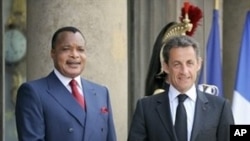The director of African Studies at New York’s Columbia University has expressed surprise that several heads of state and government of French-speaking African countries will participate in France’s anniversary celebrations Wednesday.
History professor Mamadou Diouf said there are reasons to believe that the African leaders want to re-open negotiations with France that began five decades ago that culminated in their independence.
“I’m not sure that I really understand why African heads of state decided to join President (Nicholas) Sarkozy to celebrate the creation of the French Republic following the French revolution in 1789. But, I’m quite sure that, for many of them, in particular the Francophone, it’s an opportunity to re-link in some way with France,” he said.
Professor Diouf expressed doubt the French-speaking African leaders have the political capital or clout to give them leverage in negotiating with the former colonial power.
France is scheduled to hold a large military parade Wednesday at the Champs-Elysees as part of that country’s national day celebration with the participation of African troops this year.
President Sarkozy’s government invited 14 armies from France’s former African colonies to celebrate their 50th independence anniversary during a military parade.
The 14 countries expected to take part in the military parade include Benin, Burkina Faso, Cameroon, Chad, Central African Republic, Congo-Brazzaville, Gabon, Ivory Coast, Madagascar, Mali, Mauritania, Niger, Senegal and Togo.
Observers say, as part of Mr. Sarkozy’s policies, France has begun re-negotiating defense contracts with its former colonies to draw down the French military presence on the African continent.
Some critics have accused France of negatively influencing governments in the French-speaking African countries and backing dictators with its military might, a charge Paris denies.
Professor Diouf said France should dissociate itself from influencing the political climate in its former colonies.
“France has been disengaging militarily, but for two reasons. The first reason is geo-political. You no longer need physical bases to intervene. You can have your army wherever and be able to send it. The second thing is that the direction of French political approach has changed. It’s no longer an army which has to serve (an) exclusively political objective,” Professor Diouf said.










